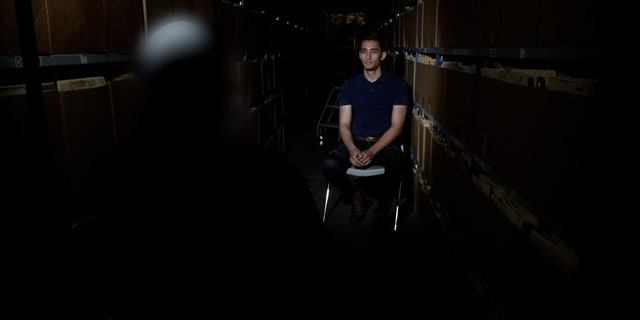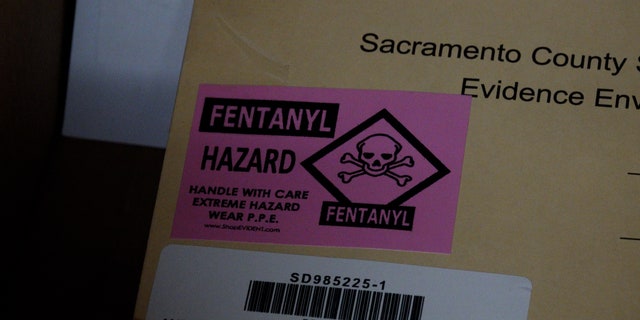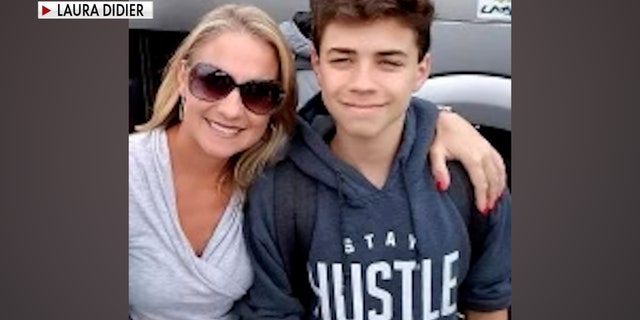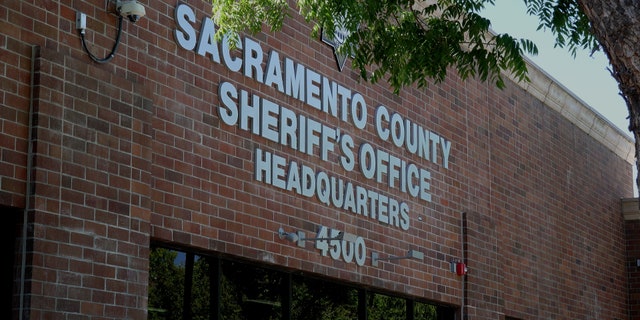NEWYou can now listen to Fox News articles!
SACRAMENTO, Calif. – California has a vast network of highways and interstates that run through nearly the entire country. Law enforcement sources say because of weak drug laws in the state coupled with the access to major highway systems and its proximity to the border, California has become a prime location for cartels to set up shop and distribute deadly drugs.
‘YOU DON’T KNOW THE WHOLE DARK SIDE’
Inside a small warehouse that reeks of marijuana just outside the capital city in California, the reality Sacramento County residents are faced with is exposed. The floors in one room are covered with thousands of pounds of illegally grown marijuana. Hundreds of guns, some semi-automatic that were used for murder, hang from steel bars that line an entire room, waiting to be destroyed. In another garage–style warehouse room, there are thousands of boxes filled with paperwork and evidence gathered at crime scenes.
Hundreds of boxes filled with deadly drugs and thousands of pounds of illegal marijuana inside a garage-style warehouse room where the Sacramento County Sheriff’s Office keeps evidence.
(Fox News)
“You don’t know the whole dark side of things.” an undercover major narcotics detective who works in California told Fox News. “What’s presented into their view is only a fraction of what’s going on.”
CALIFORNIA COP’S DEATH LINKED TO ‘FENTANYL TOXICITY,’ CORONER SAYS
“They’re called corridors. You have LA and Southern California. Those are main hubs where they’ll have several locations spread all over. Whenever they have narcotics that enter the country, they’ll be sent to stash locations,” the detective said.
These stash locations include Fresno, Sacramento and San Jose, for example.
“The narcotics will drop there, and that’s a hub for the rest of the United States. You have your I-5 corridor that runs all the way up California. You have other corridors that run east from southern California,” he explained.

A narcotics detective who investigates high-ranking cartel members across California explains that this is a growing issue across the country and that California has become a prime location for cartel members to set up and distribute deadly drugs.
(Fox News)
In the most recently available National Drug Threat Assessment report published by the Drug Enforcement Administration, California has 10 cities where cartel operations do business. The different cartel groups are classified as Transitional Criminal Organizations, according to the DEA.
“Mexican TCOs continue to control lucrative smuggling corridors, primarily across the SWB [southwest border] and maintain the greatest drug trafficking influence in the United States,” the report states.
The cartel members also have used California to grow marijuana illegally.
“The wealth that can be built off of growing on what they believe is a relatively safe place to grow without harsh penalties for that, yet they can further their organization in very large ways financially,” the detective said.

California has a vast network of interstates and highways that stretch across the country, and cartels use these to distribute drugs to surrounding states.
(Fox News)
Beyond growing illegal marijuana, the cartel also has fueled the fentanyl crisis, and law enforcement officials across the country have had to shift some efforts to combat it.
“It’s so unstable, very cheap. You can buy a fentanyl pill for three to five dollars on the street, and in that one pill for three to five dollars, you can be dead,” the detective told Fox News.
“Accidental overdoses are almost exclusively fentanyl now,” Sacramento Sheriff Scott Jones added.
According to the DEA, clandestinely produced fentanyl is primarily manufactured in Mexico.
“In China, they have super labs that are generating all sorts of different compounds,” the detective added.
The detective found that a significant amount of money has gone to China, where the cartel members have bought the compounds and materials to make fentanyl. These materials are sent to Mexico, where the fentanyl pills are pressed and created in labs.

A folder with fentanyl pills kept inside the Sacramento County Sheriff’s Office evidence warehouse April 22.
(Fox News)
“Once their final product is made, they’ll package those together and then send them through various ways to get across the U.S. border,” the detective said.
Generally, when these packages and loads of fentanyl make it across the border, it is divided and shipped throughout the country and sent to stash locations while cartel members wait for orders.
“Once it gets into the country, then it gets very complicated,” the detective said. “That one load that made it through gets broken down into 10 loads and then into 20. Then, before you know it, that one load is in eight different cities in the United States and countless people are dying everywhere,”
Jones said his department has seen an increase in emergency calls related to fentanyl exposures and incidents.
“We’ve had calls for children as young as one year old from being under the influence of fentanyl,” Jones said. “It is a crisis that not only affects the users of illicit drugs. Sometimes it’s hard to get sympathy for those who voluntarily use, but it’s not just them.”
‘WE WERE BLINDSIDED’
“Already this year, numerous mass overdose events have resulted in dozens of overdoses and deaths,” DEA administrator Anne Milgram said in April. “Drug traffickers are driving addiction and increasing their profits by mixing fentanyl with other illicit drugs. Tragically, many overdose victims have no idea they are ingesting deadly fentanyl until it’s too late,”
Recent data published by the Centers for Disease Control and Prevention found that from November 2020 to November 2021, over 100,000 deaths were related to overdoses.

Laura Didier with her son Zach.
Zachary Didier was a 17-year-old student who ran varsity track. He was a straight-A student who attended high school about 30 minutes outside Sacramento.
“Anything he did and attempted to do, he put his all into it, and he did really well,” his mother, Laura Didier, said. “To say we were blindsided is an understatement.
OHIO STATE STUDENT DEAD AFTER SCHOOL WARNS OF POSSIBLE FENTANYL LACED PILLS
“It was just shattering when we lost him because he was doing so well and working so hard, and it was so exciting to think, like, ‘Gosh, I wonder what he is going to accomplish,’ because he’s on such a great path, and it was all just ripped away,” the mother of three added.
She said he had a go-getter attitude and was a self-starter. He taught himself how to play piano by watching online videos and was focused on getting into UCLA.
“My daughter called, and I was going to be coming to the house later that day. She called to say, you need to get home right now,” Didier said.
It was two days after Christmas in 2020 when Zach’s father, Chris, found the teen unresponsive in a bedroom in their home.
“I just don’t remember much getting back to the house, but as soon as I arrived, my family was on the driveway, there were first responders. There was no ambulance. So, I had got really nervous about that because nobody is here working on him. I walked onto the driveway, and Zach’s dad, Chris, said, ‘Our baby’s gone,’” Laura Didier said.
Zach took a pill that he believed to be a Percocet. But, it was laced with fentanyl. The suspected dealer in his case has since been arrested.
“I just ask for people to have compassion, for people to really hear their stories so that we can all work together to make a difference and save lives,” his mother said.
“Too often, we talk about crime; we don’t realize or at least cognize that crime has an attendant victim. Every crime has a victim, and too often we don’t talk about the victims,” Jones said.
‘A COLLECTIVE WILL TO STOP THE TIDE’
Laura Didier has since been traveling across California to educate young people about fentanyl and to share her son’s story. She said warning other parents and education could help save lives.
A proposed bill in California, called Alexandra’s Law, was written to enhance punishments for those who deal the deadly drugs. It would allow prosecutors to charge people who manufacture or distribute with voluntary manslaughter or murder.
“This is a far deadlier issue than we’ve ever had in our country, and it’s going to require re-examining the way that our laws are set up right now,” Didier said.

The Sacramento County Sheriff’s Office has seen an increase in fentanyl-related investigations, according to Sheriff Scott Jones.
(Fox News)
The undercover detective said stiffer consequences are necessary for those who deal these deadly drugs.
“Something we see quite often is, we’ll arrest somebody, we’ll have plenty of evidence, but because of narcotics and marijuana and the entire drug environment is not viewed so much as a serious crime anymore, it’s being treated as such,” the detective said.
Often, he added, people arrested in California are back on the streets within hours or days.
“There has to be a collective will of all of us to stop the tide,” Jones added.
CLICK HERE TO DOWNLOAD THE FOX NEWS APP
He also called for increased border security to help stop criminals from crossing illegally.
“Drug abuse, drug sales, everything is out in the open now,” Jones said.